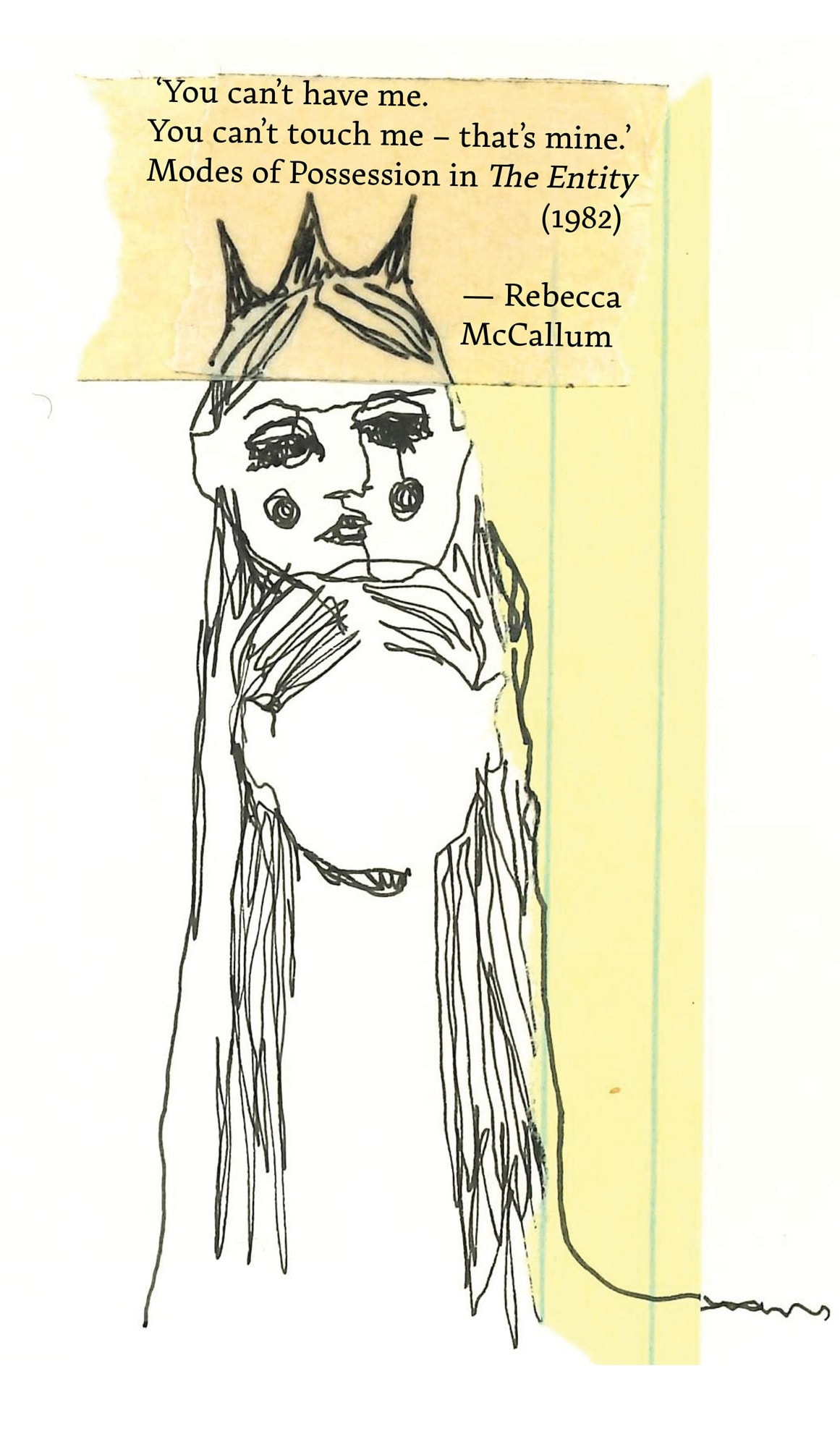‘You can’t have me. You can’t touch me – that’s mine.’ Modes of Possession in The Entity (1982)

Possession: 1. the state of having, owning or controlling something.
2. something that is owned or possessed.
3. the state of being controlled by a demon or spirit.
Although now over forty years old, The Entity remains an arresting and timely meditation on choice, control and being understood. Carla Moran is a single mother who juggles work and night school with parenting duties and maintaining a home. One evening, when preparing for bed, she experiences a violent and unwanted sexual attack from the entity of the film’s title. Throughout the film, Carla endures relentless attempts of possession that are both seen and invisible. The entity violates and abuses her persistently. However, this is more than a simple haunted house film or a tale of a woman being tormented by the supernatural. Through the dominance inflicted upon Carla by men who seek to systematically control, direct, and minimise her perspective (most notably, Doctor Sneiderman), masculinity itself represents the physical, real-world possessor of The Entity.
Possession of Space
Many of the attacks upon Carla occur in enclosed spaces in the assumed sanctuary of her family home. By crossing into the private arenas of the bedroom and bathroom where she is either dressed in nightwear or completely naked, this not only heightens her vulnerability, but most crucially represents a violation of boundaries. In later trapping her within the car and the bathroom, the entity is denying Carla ownership of personal space which is instead taken up (and possessed) by a male-coded force. In response to this, we see Carla patrolling the house with trepidation and caution. As such, she is unable to relax or be fully comfortable in her own home. This is particularly notable after the first attack when we see her fully clothed in the bedroom with a light next to her, in an attempt to create an environment of safety and protection. Whether in a home setting, at work, or within the perimeters of our own personal physical field, the space we create for ourselves as women belongs to us, and we must be able to decide who is allowed into that space. In Carla’s case (as is true for so many women), this space is invaded and destroyed–it is unrecognisable and acts as a warning that she is no longer in control.
When the attacks continue, Carla’s instinct is to leave and take refuge in her friend Cindy’s home. However, due to financial factors, she is unable to relocate permanently to another location and therefore she is forced not only to revisit, but to return to the site of her original trauma. We are all exposed to various encounters with trauma which can, in themselves, act as possessors of our everyday lives–dictating what we do, where we go and who we interact with. I once worked as a personal assistant to a CEO who had full possession of me to the extent that, even when I resigned and moved to another role in the organisation, the memories and the markings of his behaviour still had a significant impact on my choices and the way I thought about myself. When Carla takes the situation by the reins and makes a conscious decision to leave the house, her son Billy looks displeased while her two daughters appear content to stay at Cindy’s. This signifies that, as females, they are able to connect to their mother’s experience in a way that Billy (who consistently struggles to understand her) is not.
Possessed by the Professional: Dr Sneiderman
Turning to clinician Doctor Sneiderman for support and guidance, Carla immediately finds her experiences minimised as he tells her that the cold chill she is feeling is not a sign of her possession but is coming from the draft in the lobby. This instant rewriting of Carla’s feelings is an early signal of his possessive behaviour which escalates over the course of the film. In the professional setting, he is already asserting power but this graduates to a stalker-like status as he disrespects the sacrosanctity of the patient /doctor relationship.
Just as with her son Billy, Carla sees and feels things that Dr Sniederman cannot. He makes futile attempts to analyse her, taking her ‘under my care’ as he calls it, a statement that demonstrates his possessiveness as he talks at her rather than to her. Furthermore, rather than listening, he takes to making assumptions such as calling the incident when she loses control of her car a suicide attempt. At one point, he even declares that she is allowing herself to be victimised, a remark loaded with irony because he is partaking in the very threat he is warning her against.
When Carla works with a parapsychologist team she finds that things begin to shift. In making her own choices and breaking away from Dr Sneiderman, her agency increases. It is no coincidence that during this period she is lighter and more evidently at ease. She also seems more attuned with her feminine expression as we see her dressed in pink whilst next to a window from which a breeze freely circulates, a reflection of her own sense of release. This sense of independence disarms Sneiderman whose walls of possession are quickly tumbling down. When she tells him frankly that he has–in opposition to his professional responsibilities and objectives–made matters worse rather than improved them, he refuses to believe her.
From here on in, the doctor continues to assert total ownership over Carla in the most disturbing and possessive of ways and to add to this, whenever she shows any sign of defying him, he resorts to tactics of blame and gaslighting, declaring: ‘this has a lot to do with you!’ Schneiderman’s behaviour ticks all the boxes for a toxic abuser: he believes he has carte blanche on who is allowed in or out of Carla’s life and stops at nothing in order to manoeuvre events to fulfil his aims. One of his preoccupations about Carla is centred around believing that her partner Jerry (who has affairs and is always on the road for work) is a positive influence in her life because he is ‘connected to reality,’ but how good can someone like this really be for Carla? Unsurprisingly, the people who Schneiderman disapproves of Carla spending time with (the parapsychologists) are those who she feels most drawn towards. Ultimately then, Sneiderman is a possessive force seeking to control all corners of Carla’s life, from the treatment she receives to her relationships, whilst also discounting her experiences and invading her space.
Possessed by the Male Narrative
Interestingly, while Dr Sneiderman continues to push his views and ideas onto Carla, when he meets with her son Billy, the two instantly understand one another. In a brief exchange full of technical mechanical terms, they nod in comprehension–it’s a shared language, a distinctly male dialogue that exists between them. Billy’s own attitude towards his mother in the early parts of the film mirrors that of Sneiderman. While her daughters cling to her as though in recognition, he invalidates Carla’s truth. Claiming he cannot ‘hear it’, he literally fails to ‘hear’ his mother. Part way through the film we also learn from Carla that her father was abusive towards her as a child, and although now absent from her life, this male presence still governs her and has a hold. In short, he possesses her.
Male possessiveness is not reserved for Carla, as Cindy’s husband Peter can repeatedly be heard shouting orders to her offscreen. Issuing demands that place the value of his time above that of his wife, Peter possesses the martial space–to him, Cindy exists merely to serve his needs. As the film draws to a close and Carla takes part in an experiment involving a simulation of her house, the doctor in charge of proceedings–despite witnessing all that has occurred–chooses to deny it ever happened. As such, the male narrative is shown to take up space, to be the overarching authority in any given situation and to possess the ultimate power.
Choosing to Walk into the Light
When the experiment at the hospital with the parapsychologists is conducted, this concludes with Carla announcing that she is ‘tired of being scared.’ In a tense and mounting scene, this builds towards her powerful declaration: ‘you can’t touch me, that’s mine’; a call against the possession of space, choice and control that she has been subjected to. This in turn causes the simulation house to collapse in a metaphor for her breaking free. Importantly it is not clinicians nor scientists that bring this about but it is through Carla’s harnessing of her own power. Returning to her actual home which is now empty, she walks about the rooms with a renewed sense of confidence. As she heads towards the front door for the last time, there is a confidence, a determination and a quiet smile of defiance. The final decision is Carla’s to make and her choice is to walk into the future, out into the open away from the confines of the house (and of male possessiveness), to walk directly into the light.
Rebecca is a writer of horror/film analysis, an author and editor. She is Assistant Editor of Ghouls Magazine and Beauty of Horror and Senior Contributor at Moving Pictures Film Club where she has an ongoing series of essays on Hitchcock’s Women . She has by-lines with Dread Central and Rue Morgue and work in print with Grim Journal, Second Sight and Hear Us Scream.
Twitter: pendlepumpkin
Instagram: pendlepumpkin
